#Hedge funds
Explore tagged Tumblr posts
Photo
i sure fucking hope so!



14K notes
·
View notes
Text
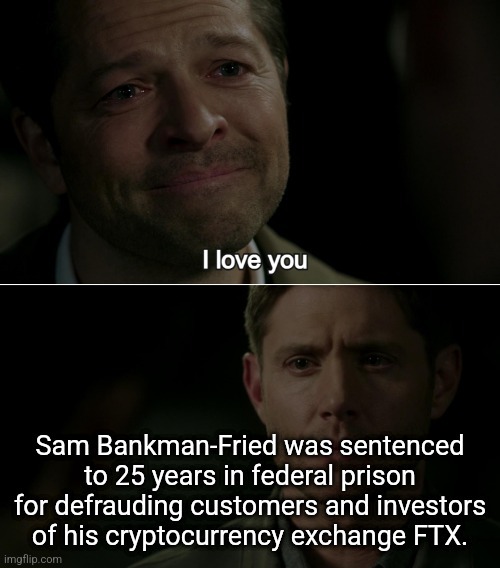
source 1
source 2
source 3
#destiel meme news#destiel meme#news#united states#us news#sam bankman fried#ftx#crytptocurrency#crypto#fraud#crypto fraud#hedge funds
245 notes
·
View notes
Photo



April 6, 2023 - Rail workers protesting the raising of the pension age occupied the French headquarters of investment company Blackrock, saying that the money for workers’ pensions could easily be found if Blackrock and other corporations were taxed properly. [video]
#paris#france#pensions#anti-neoliberalism#unions#occupation#gif#2023#class war#blackrock#anticapitalism#flare#cgt#workers#working class#flag waving#hedge funds
299 notes
·
View notes
Text

hey hey
just your casual up and coming stock queen
#stocks#stocks and bonds#trust fund#selfie#pretty#cute#blonde#peace sign#business#business school#cpafirm#cpa course details#hedge funds#motivation#adorable#slc#lets go#smart woman#beauty and brains#barbie core#mba#mba specializations#girlblogging#girl#modest fashion#christian girl#short girl
20 notes
·
View notes
Text
Ko-Fi prompt from @dirigibird:
I've been looking at investment options but I don't want to be messing around too much with the stock market, and a co-worker suggested exchange traded funds. Would love to know your opinions!
LEGALLY NECESSARY DISCLAIMER: I am not a licensed financial advisor, and it is illegal for me to advise anyone on investment in securities like stocks. My commentary here is merely opinion, not financial advice, and I urge you to not make any decisions with regards to securities investments based on my opinions, or without consulting a licensed advisor. I am also going to be talking this all over from an American POV, which means some of these things may not apply elsewhere.
So instead of letting you know what to pick or how to organize your securities, I'm going to go through the definitions of what various investment funds are, how they compare functionally, and maybe rant about how I disagree with the stock market on a fundamental ethical level if I have word count left over.
If you want more information, and are okay with jargon, I'd suggest hitting up investopedia. That is where I will be double-checking most of my information for this one.
I also encourage folks who know more about the stock market specifically to jump in! I like to think I'm good at research and explaining things, but I'm still liable to make mistakes.
Mutual Funds: A mutual fund is a pool of money and resources from multiple individuals (often vast numbers of people, actually) being put together and managed as a group by investment specialists. The primary appeal of these is that the money is professionally managed, but not personally so; it gives smaller investors access to professional money managers that they would not have access to on their own, at cheaper rates than if they tried to hire one for just their own assets. The secondary appeal is that, due to the sheer number of people, and thus capital, that is being invested at once, the money can be invested in a wide variety of industries, and is generally more stable than investing in just one company or industry. Low risk, low reward, but overall at least mostly reliable. Retirement plans are often invested in mutual funds by employer choice, through companies like Fidelity or John Hancock.
Hedge Funds: A hedge fund is a high risk, high reward mutual fund. Investors are generally wealthy, and have the room and safety to lose large amounts of money on an investment that has no promise of success, especially since money cannot be withdrawn at will, but must remain in the fund for a period of time following investment. It gets its name from "hedging your bets," as part of the strategy is to invest in the opposition of the fund's focus in order to ensure that there is a backup plan to salvage at least some money if the main plan backfires. Other strategies are also on the riskier side, often planning to take advantage of ongoing events like buyouts, mergers, incumbent bankruptcy, and shorting stocks (that's the one that caused the gamestop incident).
Private Equity: Private equity is... a nightmare that got its own incredibly good Hasan Minhaj episode of Patriot Act, so if you've got 20 minutes, an interest in comedically-delivered, easily-digestible, Real Information, and an internet connection, take a watch of that one. (If it's not available on YouTube in your country, it's originally from Netflix, or you can probably access it by VPN.) Private equity companies are effectively hedge funds that purchase entire companies, rebuild them in one way or another, and then sell them at (hopefully) a profit. Very often, the companies purchased by private equity are very negatively impacted, especially if the private equity group is a Vulture Fund. Sometimes, it's by taking it apart to sell off; sometimes it's by just bleeding it for cash until there's nothing left. Sometimes, it's taking over a hospital and overcharging the patients while also abusing the staff! (Glaucomflecken has a lot of videos on the topic of private equity in the medical industry, check him out.)
Venture Capital: In contrast to private equity, which purchases more mature companies, venture capital is focused on startups, or small businesses that have growth potential. These are the kinds of hedge funds that are like a whole group that you'd see some random tv character calling an Angel Investor (they're not actually the same thing, but they overlap by a lot). I'd hesitantly call these less ethically dubious than private equity, but I'm still suspicious.
And finally, to answer your question on what ETFs are and how they fit into the above.
Exchange Traded Funds: ETFs are... sort of like a mutual fund. Sort of. You are, to some extent, pooling your money... ish.
An ETF is like a stock that is made out of partial stocks. So instead of paying $100 for stock A, and not getting stocks B/C/D that all cost the same, you buy $100 of the ETF, which is $25 each of stocks A/B/C/D. You are getting a quarter of a unit of stock, which isn't normally an option, but because you are purchasing through an ETF that officially already bought those Whole stocks, you can now purchase the partial stocks through them.
They buy the whole stocks, then they resell you mixes of those stocks. They still officially own the whole stocks themselves, but you now own parts of the stocks. Basically, you own "stock" in a company that owns stock in other companies, and in that process you own partial stocks in those other companies.
I'm going to re-explain this using fruit.
Imagine you can buy apples, oranges, melons, grapes, etc. You can also buy fruit cups. You can only buy the individual fruits in big batches or you can pool your money with a few other people, hand it to a chef. The chef will decide which fruits look like they'll taste the best by lunch time, buy a bunch of those fruit pallets with your combined money, and plan out the best possible fruit salad for you to share with a bunch of people once lunch rolls around.
You could also buy a fruit cup. You don't have a lot of control over what's already in the fruit cup, but there are a few different mixes available--that one has strawberries, but that one over there uses kiwi, and the other one that way has pineapple--and you can pick which mix you want. It's a pretty small fruit cup, and it's predesigned, but you can choose the one you want without having to pool money with everyone else. You just first have to let someone else design the fruit cups you choose from, and you don't know which ones are probably going to survive the best to lunch time unless you ask a chef (which defeats the purpose of buying a fruit cup instead of pooling your money, and asking the chef costs money).
That's the ETF. The ETF is the fruit cup.
The upside is that you can now just track the prices of your fruit cup, instead of tracking the prices of four different fruits, and so if the price of one fruit drops, you can just... let the other three buoy it.
Of course, in the real world, there are more than just four stocks involved in an ETF. This part of the Investopedia article lists a few examples, and they're usually themed and involve anywhere from 30 (DOW Jones) to thousands (Russell) of shares by stock type, or by commodity/industry. So with the ETF, you can invest in an entire industry, like technology, and just keep track of that single "stock" in the industry game.
They do cost less in brokerage/management fees than regular mutual funds, and they have a slightly lower liquidity (slower to cash out). There also exist actively managed ETFs, which are basically mutual funds for ETFs. You are paying the chef to buy you premade fruit cups.
(Prompt me on ko-fi!)
#economics#stock market#etfs#etf#mutual funds#hedge funds#venture capital#private equity#capitalism#phoenix talks#ko fi#ko fi prompts#economics prompts
51 notes
·
View notes
Text
BlackRock Recruiter Who ‘Decides People’s Fate’ Says ‘War is Good for Business' Undercover Footage
youtube
#blackrock#james o'keefe#campaign finance#hedge funds#wall street#politics#military industrial complex#russia#ukraine#economy#agriculture#market manipulation#o'keefe media group#political manipulation#ESG#propaganda#war propaganda#war profiteers#Youtube
63 notes
·
View notes
Text
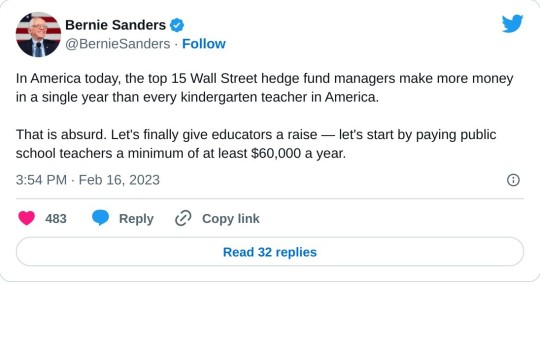
#us politics#twitter#tweet#sen. bernie sanders#vermont#wall street#hedge funds#tax the rich#tax the 1%#tax the billionaires#education system#education#education reform#department of education#2023#public schools#public education#progressivism#progressive politics
77 notes
·
View notes
Text
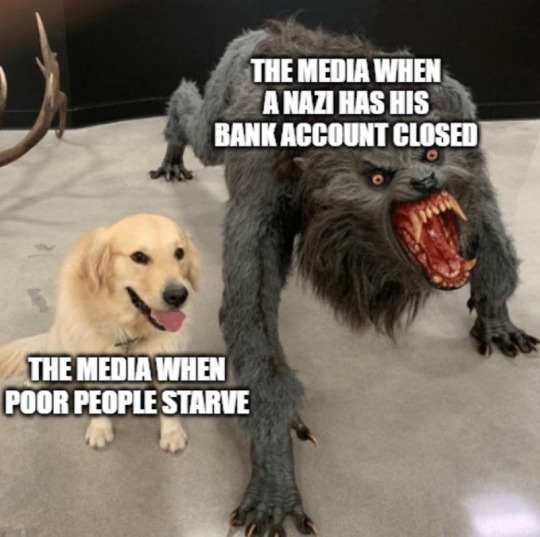
#uk#politics#ukpol#media#nigel farage#nazi#far right#coutts#natwest#shorting#hedge funds#gb news#poverty
40 notes
·
View notes
Text
#college football#ncaa#ncaa football#college football playoff#nfl#nfl football#cfp#espn#big 10#big 12#sec football#college#university#investment#hedge funds#professional sports#sports#big business#future#business#economy#usa#america#gameday#college gameday#ncaa men's basketball#nfl memes#nfl news#news#transfer
2 notes
·
View notes
Text

#crime pays#hedge funds#goldman sachs#John Paulson#donald trump#crisis of legitimacy#american exceptionalism
4 notes
·
View notes
Text
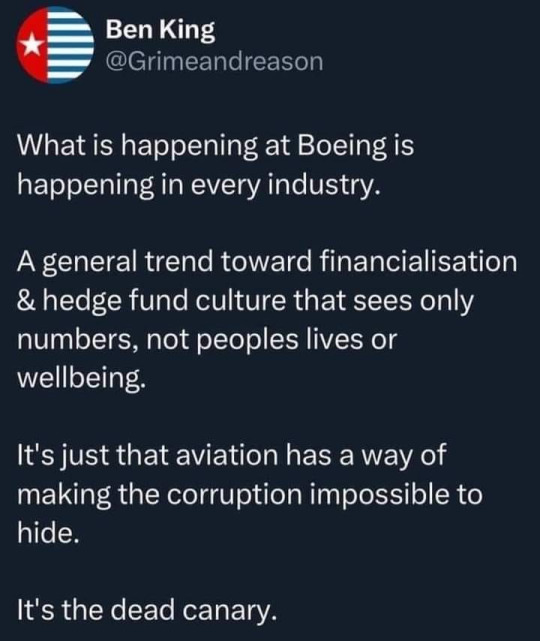
"What is happening at Boeing is happening in every industry. A general trend toward financialisation & hedge fund culture that sees only numbers, not peoples lives or wellbeing. It's just that aviation has a way of making the corruption impossible to hide. It's the dead canary." - Ben King
#benking#book quotes#quotes#quoteoftheday#book quote#life quote#beautiful quote#quote#quotable#boeing#industry#ausgov#politas#auspol#tasgov#taspol#australia#fuck neoliberals#neoliberal capitalism#anthony albanese#albanese government#financialisation#capitalism#hedge funds#culture#aviation#government corruption#biden corruption#political corruption#corruption
2 notes
·
View notes
Text

Paper chasers
11 notes
·
View notes
Text
Dumb Money (2023) Review
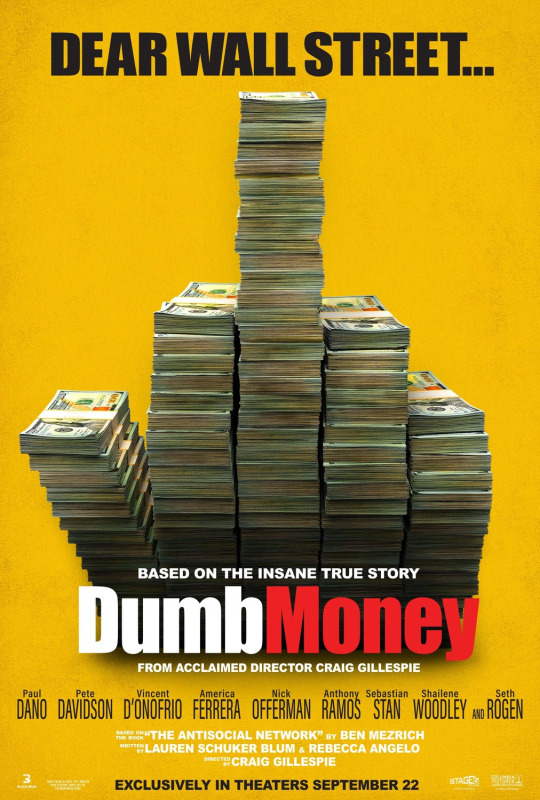
Does anyone else think that Seth Rogen looks like a cuddlier version of David Boreanaz? Angel's stoner brother? No? Anyone? Alright then, just me as always.
Plot: Everyday people flip the script on Wall Street and get rich by turning GameStop into one of the world's hottest companies. In the middle of everything is Keith Gill, a regular guy who starts it all by sinking his life savings into the stock. When his social media posts start blowing up, so does his life and the lives of everyone following him. As a stock tip becomes a movement, everyone gets wealthy -- until the billionaires fight back and both sides find their worlds turned upside down.
Looking back at the COVID pandemic, now it seems so strange that that time even happened. A time of dread and uncertainty, now almost feels like a 2-year blip, where things were off but then all of a sudden we have returned to normal. Doesn't seem real. Think of Thanos snapping his fingers and dusting half the world's population away for 5 years and then they all come back and it's back to regular hijinks. Regardless, the pandemic lockdowns were crappy, but one of the few glimmers of hope and goodness came from that whole GameStop stock event when a bunch of Redditors and online geeks managed to take down multiple Wall Street hedge funds that were originally gaining money from other's people's losses. Reading about it on the news was absolutely mad, and naturally, now we have a movie about it.
If you're looking for a factual detailed behind-the-scenes depiction of what occurred, and also if you're seeking out a lesson in finance, Dumb Money isn't that type of movie. I'm sure there is a Netflix documentary out there that delves deeper into the ins and outs of it all, as for this movie, this is very much a classic David vs. Goliath tale of regular people sticking it to the man. The combination of winning personalities and a mind-blowing reality makes for a very entertaining film, if not profound, yet this is a prime example of a crowd-pleaser. And to be fair, with all the politicians, tech firms, and media that get sucked into the events of the movie, it does seem like director Craig Gillespie has taken some creative liberties in inflating the revolutionary aspect of what was ultimately achieved, as even though the situation that transpired is undoubtedly absurd and the type of I-cannot-believe-this-really-happened situation, I feel the movie made it a bigger deal than it actually was. The over-dramatization is self-aware in this movie though, as the hedge-fund billionaires here are presented as very cartoon-villain-esque, with Pete Davidson's character even observing in-movie how the rich Wall Street joes seeming to have come straight out of a Disney animation.
It boasts a solid cast too, with Paul Dano showcasing yet again that he doesn't always need to play creepy dudes, and that in fact, he can be very likable and heartwarming. Though for those who have seen Okja that should not come as a surprise. Shailene Woodley as his wife shares good chemistry and the two performers commit to the meaning behind the meme-ry. Seth Rogen, Vincent D'Onofrio, Sebastian Stan, and Nick Offerman are fittingly slimy and evil as the Wall Street chaps, with America Ferrera and Anthony Ramos as some of the regular folk who managed to cash in on the action round out the cast well. Dane DeHaan pops in too as a company sales rep and is entertainingly unrecognizable. That being said, with this huge cast of characters there is, perhaps, a little too much bouncing around between stories, and not all the plot threads land powerfully. Pete Davidson as Gill’s layabout brother doesn’t add much, and America Ferrera as the nurse, as sweet as she is, doesn't really get much to do besides look at her phone all the time. Then again, who didn't spend hours upon hours staring at their phone during lockdown, am I riiiiiight??....
Gillespie’s directorial style is funky and fun, and he tailors his film to the subject matter. Again, it's nowhere as deep or clever as, say, The Big Short, however, it's an entertaining and empowering movie that showcases what can happen when people actually come together to show it to the man. Though could have done less with that brass language in the soundtrack. Nearly every scene was accompanied by some rap about f**ks and ducks. And yeah, I get it, Dano's character likes cats in this, but saying the word pussy seventy-five times isn't high-brow humour. Nonetheless, Dumb Money is an easy watch. Definitely the best choice between it and The Expendables. No shade. Now - let's go buy some stocks!!
Overall score: 6/10

#dumb money#gamestop#stock market#craig gillespie#comedy#drama#movie#film#movie reviews#film reviews#cinema#hedge funds#gamestop stock#paul dano#dumb money review#shailene woodley#seth rogen#nick offerman#pete davidson#vincent d'onofrio#dane dehaan#america ferrera#anthony ramos#sebastian stan#money#2023#2023 in film#2023 films
3 notes
·
View notes
Text
According to public records, the hedge fund — which is headquartered on Madison Avenue in Manhattan — has bought at least $20 million worth of land in Western Colorado in the last five years, making it one of the largest landowners in the Grand Valley.
The hedge fund, founded in 2005, says it invests exclusively in assets and companies that ensure water supply and quality. In 2021, its co-founder and president, Matthew Diserio, called water in the United States "a trillion-do
3 notes
·
View notes

